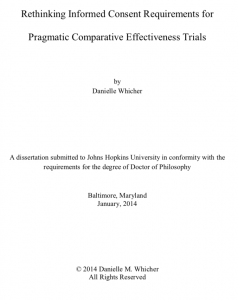Rethinking Informed Consent Requirements for Pragmatic Comparative Effectiveness Trials
about the project
The objective of this project was to explore the question of whether there are morally permissible and socially acceptable alternatives to prospective informed consent for low-risk pragmatic comparative effectiveness trials of two or more evidence-based and widely-used medical interventions. To address this, the project involved qualitative research as well as a moral and policy analysis. The qualitative research component included conducting focus groups with patients and interviews with researchers and institutional review board members at two institutions. The results demonstrate that most participants felt that it was important for eligible individuals to be informed about these types of trials. However, most also felt that it was acceptable to streamline the amount of information disclosed and to ask individuals to opt-out if they would prefer not to participate. The moral analysis concluded that it is sometimes acceptable to limit the autonomous choice of individuals in situations where the decision to participate in research is unlikely to engage important self-determination interests that those individuals have. Taken together, these findings suggest that it would be appropriate for policy makers to consider revising the regulations to allow study-specific disclosure statements for this type of research to be simplified such that the information provided about widely-used, evidence-based interventions is similar to the amount of information provided about those interventions as part of appropriate standard clinical care practices. It may also be appropriate to ask participants to opt-out, instead of opt-in, if they would prefer not to participate.
